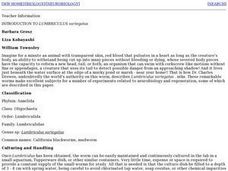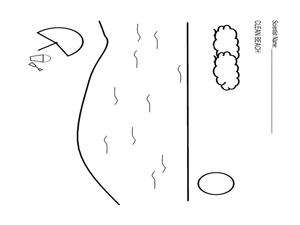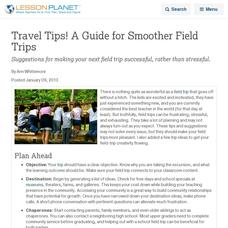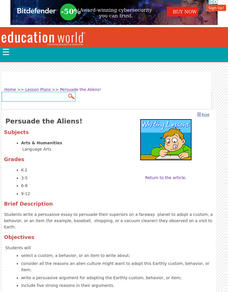Curated OER
Building Empathy Creating Community
Learners thrive in a classroom where they are part of a strong community. Foster a collaborative atmosphere in your classroom with a series of activities focused on conflict resolution, communication, empathy, and defense against bullying.
PBS
Team Work and Planning
Welcome to the Great Marshmallow Challenge. To conclude a unit study designed to help scholars develop teamwork and collaboration skills, groups are charged with developing a free-standing structure using only one marshmallow, 20 pieces...
Missouri Department of Elementary
Are You Balanced?
Balance scales create a strong visual of how an individual prioritizes one's self alongside their commitments to the community, school, and home. Scholars complete a graphic organizer then discuss their findings with their peers. A...
PBIS World
Forced-Choice Reinforcement Menu
Find the best way to appeal to the kids in your class with a positive reinforcement survey. Using forced choices, they decide which of two options would be better for them, based on adult approval, peer approval, independent rewards,...
Space Awareness
Investigating the Atmosphere - Air Takes Up Space
How do you know there is air? Can you see it, smell it, feel it? To begin the investigation, learners watch a video and discuss what they know about air and the atmosphere. Then, they participate in five different hands-on, inquiry-based...
Curated OER
Education: Passing Enough Knowledge to Survive to the Next Generation
Students compare and contrast the knowledge requirements for human and animal children. They identify the consequences of an animal if it is unprepared for the given environment. They discover the importance of education as well.
Curated OER
Setting Assertive Goals
Young scholars study assertiveness and how they can grow personally in this area. In this social skills lesson plan students set goals and complete an assertiveness worksheet.
Curated OER
Choices Have Consequences
Second graders handle grievances without getting angry or using violence.
Curated OER
Blue Planet: Tidal Seas
Students investigate how tides affect sea life. In this video based instructional activity, students view a video on how tides affect sea life. They do web-based research to find the answers to a series of questions and then play Tidal...
Curated OER
Academic Raceway: Animals
This animals PowerPoint provides a race car game in which students answer a variety of questions about animals, the majority of which are based on ways in which animals adapt to their surroundings and behave to survive.
Curated OER
Introduction to Lumbriculus variegatus
Students conduct two set experiments on Lumbriculus worms and create a third experiment of their own. The first of the two set experiments allows students to observe regeneration of the worms while the second allows students to test the...
Curated OER
Fish Hazards
Students study the Pacific salmon and see the different challenges they face. In this environment lesson students complete several activities that show how humans have affected the salmon environment. These activities have varying...
Curated OER
Travel Tips! A Guide for Smoother Field Trips
Suggestions for making your next field trip successful, rather than stressful.
Curated OER
Contraception
Just about everything you need to teach a unit on sexual education. Diagrams, charts, factual information all here. This lesson plan is thorough and goes step by step in guiding everyone through the topics providing questions for...
Curated OER
Mathemafish Population
It's shark week! In this problem, young mathematically minded marine biologists need to study the fish population by analyzing data over time. The emphasis is on understanding the average rate of change of the population and drawing...
King Country
Lesson 26: HIV/AIDS & Other STDs - Day 3: HIV/AIDS
The third lesson in the three-part series on HIV/AIDS and other STDs considers how these diseases are passed, how to protect against them, and risky and safe behaviors. The discussion of condom use and sexual behaviors are explicit.
Curated OER
STD & HIV/AIDS, Day 2: HIV/AIDS - Staying Safe
Decrease risky behavior and inform your secondary Special Ed class about AIDS/HIV. They talk about germs, AIDS, transmission, and staying safe. Developmentally disabled individuals need to be informed about safe sex and disease...
Curated OER
Toxicants and California Blackworms
Learners determine the normal behavior of California blackworms. They determine how various concentrations of assigned toxicants affect the worm's behavior. Students are introduced to testing of potential toxicants, an important...
Curated OER
Relationships, Day 5: Acquaintances & Strangers
It is important for special needs students to know the differences between acquaintances and strangers. They define the world helper, acquaintance, and stranger then discuss a scenario based case study.They talk about touch and no touch,...
Curated OER
Persuade the Aliens!
Why do we do what we do? Imagine that people on a faraway planet came to visit Earth. Could you convince them to adopt a custom or behavior that we participate in here? Learners of all ages write persuasive essays. If you're using this...
Curated OER
Special Accommodations
This accommodations template provides a checklist of special accommodations that may be required for special needs learners in six areas: attention, academic, behavior, testing, speech/language, and OT/PT. Space is also provided for...
Curated OER
Oops, I Did Not Say it Right
Your little learners listen to the story Chicken Little in order to explain how behavior affects interpersonal communication. They engage in a class discussion to determine the differences between truth and gossip.
ESL Kid Stuff
Intro ESL Lesson (Ages 8-14)
Introduce language learners to class behavior expectations, and each other, with activities that include greeting and name games, conducting a class survey, and creating a classroom rules poster.
US Department of Energy
Electric Avenue: Parallel and Series Circuits
Can you infer the wiring diagram of a series of lights based on their behavior alone? Scholars work with multiple boxes of four lights. They must flip the switch and decide how the lights are wired. By applying their knowledge of...

























